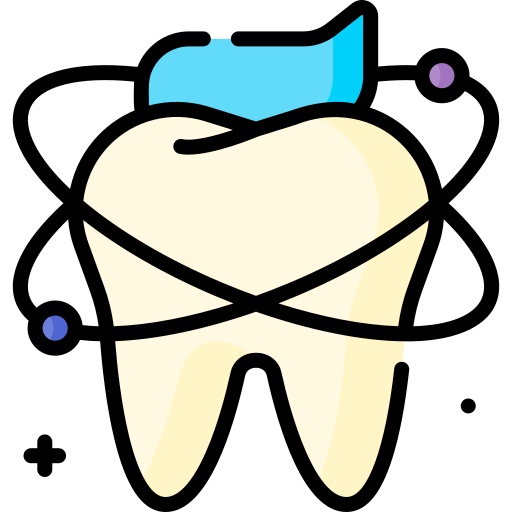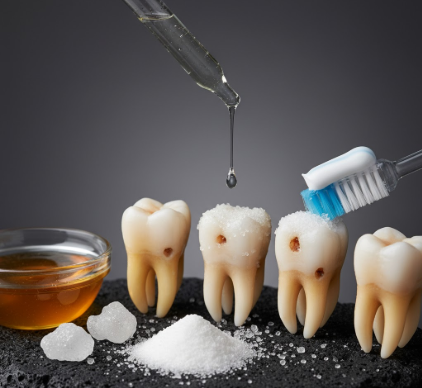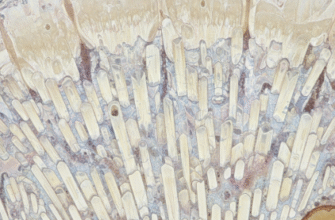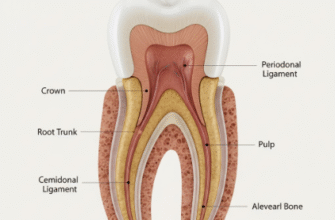It’s a common scene: you’re eyeing a sweet treat, and a little voice whispers about the dental doom that awaits. For ages, we’ve been told that anything sweet is an automatic enemy of our pearly whites. This blanket condemnation, however, lumps all sweeteners into one problematic pile, suggesting they all wage war on our enamel with equal ferocity. But is this really the case? Does every substance that tickles our taste buds with sweetness automatically sign a cavity contract with our teeth? The truth, as is often the case, is a bit more nuanced and, frankly, quite a bit more interesting.
The Real Story Behind Sweetness and Tooth Decay
Before we can fairly judge our lineup of sweeteners, we need a quick refresher on how cavities actually form. It’s not the sweetness itself that drills holes in your teeth. The primary culprits are specific types of bacteria residing in our mouths, most notoriously
Streptococcus mutans. These microorganisms absolutely adore sugars and other fermentable carbohydrates. When you eat something sugary, these bacteria throw a party. They metabolize these sugars, and as a byproduct of their feast, they produce acids. It’s these acids that are the real villains. They attack the hard, protective outer layer of your teeth, the enamel, leaching out essential minerals in a process called demineralization. If this acid attack happens frequently enough, and without sufficient time for your saliva to neutralize the acids and remineralize the enamel, a weak spot can develop, eventually leading to a cavity. So, the key question for any sweetener is: can these oral bacteria use it to produce acid?
The Usual Suspect: Table Sugar (Sucrose)
Let’s start with the most infamous of them all:
sucrose, or common table sugar. This is the gold standard by which dental damage is often measured, and for good reason. Sucrose is highly fermentable by cariogenic (cavity-causing) bacteria. They break it down with ease, leading to a rapid production of harmful acids and a significant drop in the pH level in your mouth. High Fructose Corn Syrup (HFCS), another common sweetener in processed foods and drinks, behaves very similarly to sucrose in the oral environment, readily providing fuel for these acid-producing bacteria. Think of sucrose and HFCS as an open invitation for these bacteria to thrive and wreak havoc on your enamel. Frequent consumption means frequent acid attacks, making your teeth vulnerable.
What About “Natural” Sugars?
Many people reach for “natural” alternatives like honey, maple syrup, agave nectar, or molasses, believing them to be gentler on the body, and by extension, on the teeth. While these sweeteners might come with a few trace minerals or antioxidants that refined sugar lacks, from a purely dental perspective, they are still largely composed of fermentable sugars like fructose, glucose, and sucrose. Oral bacteria aren’t particularly discerning about the origin of their sugary meal. Whether it’s from a sugar cane field, a beehive, or a maple tree, if it’s a sugar they can metabolize, they will. So, while the “natural” label might feel healthier, these sweeteners can still contribute to acid production and tooth decay if consumed in the same patterns as regular sugar. They might offer some broader nutritional benefits, but your teeth will still register them as a sugar source capable of fueling the decay process.
The Sweeteners That Change the Game: Sugar Alcohols
Now we venture into territory where the “all sweeteners are equally bad” myth really starts to crumble. Enter sugar alcohols, also known as polyols. Despite their name, they contain neither sugar (in the traditional sense) nor alcohol (ethanol). They are carbohydrates that have a chemical structure partly resembling sugar and partly resembling alcohol. The interesting part? Many of them are not easily metabolized by oral bacteria, or not metabolized at all!
Xylitol: The Dental Darling
If there’s a star player in the tooth-friendly sweetener league, it’s often considered to be
xylitol. This sugar alcohol, found naturally in small amounts in fruits and vegetables like berries and corn cobs, has some remarkable properties. Most cariogenic bacteria, including Streptococcus mutans, cannot ferment xylitol. This means no significant acid production occurs when xylitol is consumed. In fact, it goes further than just being non-cariogenic (not causing cavities). Some research suggests xylitol can actively interfere with the growth and metabolism of these harmful bacteria. They try to consume it, but can’t process it effectively, which can hinder their ability to adhere to teeth and produce plaque. Some even say it can help promote remineralization by stimulating saliva flow, which is rich in calcium and phosphate. While it’s not a magic bullet to replace brushing and flossing, its unique properties make it a standout.
Erythritol: Another Strong Contender
Close on xylitol’s heels is
erythritol. This is another sugar alcohol that boasts excellent dental credentials. Like xylitol, erythritol is virtually non-cariogenic because oral bacteria cannot metabolize it to produce acids. It’s even smaller in molecular size than other polyols and is mostly absorbed in the small intestine and excreted unchanged in urine, meaning it has fewer gastrointestinal side effects for many people compared to some other sugar alcohols if consumed in large quantities. Erythritol doesn’t contribute to tooth decay and is often found in sugar-free chewing gums, candies, and even some baking products designed to be tooth-friendly. Its clean, sweet taste, similar to sugar, also makes it a popular choice.
Sorbitol and Mannitol: A Mixed Bag, But Still Better
Other sugar alcohols like
sorbitol and
mannitol are also used as sugar substitutes. While they are certainly less cariogenic than sucrose, they aren’t quite in the same league as xylitol or erythritol. Some strains of oral bacteria *can* slowly ferment sorbitol and mannitol over time, leading to some acid production. However, this process is much slower and results in far less acid compared to the rapid fermentation of sugar. Therefore, while they might not be entirely “non-cariogenic,” they are considered “less cariogenic” or “hypo-cariogenic.” You’ll often find them in sugar-free gums and candies. They are a step up from sugar, but perhaps not the absolute best choice if maximum dental protection from a sweetener is your goal.
Artificial Sweeteners: The Non-Nutritive Options
Then there’s the category of high-intensity, non-nutritive sweeteners. These are substances that are many times sweeter than sugar, so only tiny amounts are needed. Common examples include:
- Aspartame
- Sucralose
- Saccharin
- Acesulfame Potassium (Ace-K)
- Stevia (Rebaudioside A)
- Monk Fruit Extract
From a dental health perspective, these sweeteners are generally considered non-cariogenic. Why? Because oral bacteria simply don’t recognize them as food. They cannot be fermented or metabolized by the bacteria in your mouth to produce acids. So, when you consume a diet soda sweetened with aspartame or a sugar-free yogurt sweetened with sucralose, you’re not providing the fuel for that acid attack on your enamel. This makes them a tooth-friendly way to satisfy a sweet craving without directly contributing to the decay process. Of course, there are ongoing discussions about the broader health implications of some artificial sweeteners, but strictly in terms of their direct effect on tooth decay, they don’t pose the same threat as sugar.
It’s scientifically recognized that not all sweeteners behave the same way in the oral environment. Sugar alcohols like xylitol and erythritol are particularly noteworthy as they are not fermented by cavity-causing bacteria into harmful acids. In fact, xylitol has been shown to possess properties that can actively reduce levels of decay-causing bacteria, like Streptococcus mutans. This starkly contrasts with traditional sugars, such as sucrose, which are readily converted into enamel-eroding acids.
Why Does This Distinction Matter?
Understanding that not all sweeteners are dental villains empowers you to make more informed choices. If you’re someone who enjoys sweet foods and drinks regularly, or if you’re particularly prone to cavities, choosing products sweetened with xylitol, erythritol, or non-nutritive sweeteners can make a tangible difference to your oral health. It’s about reducing the frequency and intensity of acid attacks on your teeth. Every time you opt for a non-cariogenic or less cariogenic sweetener over sugar, you’re giving your teeth a break. This doesn’t mean you can consume unlimited amounts of “tooth-friendly” sweets – moderation is still key for overall health, and some sugar alcohols can cause digestive upset in sensitive individuals if consumed excessively. But for your teeth, the switch can be beneficial.
Sweeteners Are Only Part of the Picture
It’s crucial to remember that the type of sweetener you consume is just one piece of the oral health puzzle. Even if you meticulously avoid sugar and opt for tooth-friendly alternatives, you can’t neglect the fundamentals of good oral hygiene.
Regular and effective brushing (twice a day with fluoride toothpaste),
daily flossing to clean between teeth where brushes can’t reach, and
routine dental check-ups and cleanings are absolutely essential. These practices remove plaque, manage bacteria levels, and allow your dentist to catch any potential issues early. No sweetener, no matter how tooth-friendly, can replace these foundational habits.
Reading Labels: Your Key to Smarter Choices
Becoming a savvy consumer starts with reading ingredient labels. “Sugar-free” doesn’t always tell the whole story from a dental perspective, although it’s often a good start. Look for specific sweeteners listed. If you see xylitol or erythritol high up on the ingredient list of a sugar-free product, that’s generally a good sign for your teeth. If it contains sorbitol, it’s better than sugar but perhaps not as optimal as xylitol. Understanding these distinctions allows you to pick products that align with your goal of minimizing sugar-fueled acid attacks.
So, the next time you hear that all sweeteners are equally detrimental to your dental health, you’ll know better. The world of sweeteners is diverse, and their impact on your teeth varies dramatically. While traditional sugars like sucrose are undoubtedly a primary driver of tooth decay, many alternatives, particularly certain sugar alcohols and non-nutritive sweeteners, offer sweetness without fueling the acid-producing bacteria in your mouth. Making informed choices, alongside diligent oral hygiene, can help you enjoy a little sweetness in your life without constantly worrying about the dental bill.









